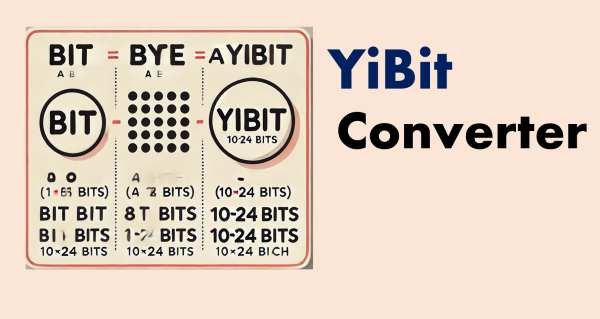Yibit (Yottabit) Converter
The Yibit (Yottabit) Converter is a tool designed to help you convert Yibits (Yottabits) to Bits, Kilobits, Megabits, Gigabits Terabits as well as other storage units such as Petabits, Exabits, and Zettabits.
It is a unit of digital information used to measure large amounts of data, especially in high-capacity data centers, cloud computing, or large-scale networks.
So, if you are working in data storage, analyzing network speeds, or learning about digital units, this converter will be beneficial for accurate results.

To use this converter, enter the Yibit value in the input field, select the unit from the dropdown menu and click the Convert button to get the result in the following format.
Note: The Ybit is not an official unit in the International System of Units (SI). However, it is used to informally in digital contexts as the Yottabit (Yibit), which is a unit of digital information.
| Unit | Value |
|---|---|
| Bits | 0 |
| Kilobits | 0 |
| Megabits | 0 |
| Gigabits | 0 |
| Terabits | 0 |
| Petabits | 0 |
| Exabits | 0 |
| Zettabits | 0 |
How to Calculate?
To convert Yibit to other units, use the following formulas:
- 1 Yibit = 1024 Bits
- 1 Yibit = 1012 Kilobits
- 1 Yibit = 109 Megabits
- 1 Yibit = 106 Gigabits
Data Unit Conversion Table
| Unit | Value in Yibit |
|---|---|
| Bits | 1024 per Yibit |
| Kilobits | 1021 per Yibit |
| Megabits | 1018 per Yibit |
| Gigabits | 1015 per Yibit |
| Terabits | 1012 per Yibit |
| Petabits | 109 per Yibit |
| Exabits | 106 per Yibit |
| Zettabits | 103 per Yibit |
| Yottabits | 1 per Yibit |
| Bytes | 1.25 × 1023 per Yibit |
| Kilobytes | 1.25 × 1020 per Yibit |
| Megabytes | 1.25 × 1017 per Yibit |
| Gigabytes | 1.25 × 1014 per Yibit |
| Terabytes | 1.25 × 1011 per Yibit |
| Petabytes | 1.25 × 108 per Yibit |
| Exabytes | 1.25 × 105 per Yibit |
| Zettabytes | 1.25 × 102 per Yibit |
| Yottabytes | 0.125 per Yibit |
Basic Information on Data Units:
Here is a brief description of each unit related to data size, such as bits, kilobits, megabits, gigabits, terabits, petabits, exabits, zettabits that may help you understand:
- Bits (B): A bit is a basic unit of data in digital communication and is a binary value of `0` or `1`. Bits are used to measure the smallest amount of information of speed.
- KiloBits (Kb): One kilobit is equal to 1,000 bits and is used to measure data transfer rates in networks, such as the speed of a broadband connection.
- Megabits (Mb): One megabit is equal to 1,000 kilobits or 1,000,000 bits. This unit is used to measure internet speeds and download speed of file sizes, such as videos and images.
- Gigabit (Gb): One gigabit is equal to 1,000 megabits or 1,000,000 kilobits or 1,000,000,000 bits. Gigabits are used to measure the speed of internet connections, large data transfers, or bandwidth capacity in networking.
- Terabit (Tb): One Terabit is equal to 1,000 gigabits or 1,000,000 megabits or 1,000,000,000 kilobits. It is used in enterprise-level data storage systems.
- Petabit (Pb): A petabit is equal to 1,000 terabits or 1,000,000 gigabits. This unit is used to measure very large data volumes, such as total Internet traffic or data storage on a global scale.
- Exabit (EB): It is equal to 1,000 petabits or 1,000,000 terabits and is used to describe the massive storage systems in a large data center.
- Zettabit (ZB): A zettabit is equal to 1,000 exabits or 1,000,000 petabits and is a very large unit of data. It is used to measure the vast scale of data generated globally.
Bit vs Byte:
A bit is the smallest data unit in computing, and has a binary value of 0 or 1. A byte contains 8 bits and is used to represent characters or data in memory. Bits measure data transmission speed, while bytes measure file size and storage capacity. 1 byte = 8 bits
